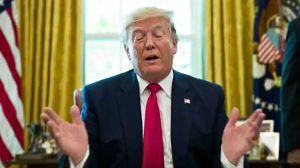Stay updated with the latest - Click here to follow us on Instagram
AAP govt to audit private schools’ accounts, punish those seeking capitation fees
Some of the measures include levying heavy fines on schools charging a capitation fee, scrutinising the accounts of private schools and even centralising EWS admissions.
 Schools found screening teachers or parents will have to pay a fine of Rs 5 lakh the first time and Rs 10 lakh if it is found doing so again.
Schools found screening teachers or parents will have to pay a fine of Rs 5 lakh the first time and Rs 10 lakh if it is found doing so again.
Ahead of the winter session of the Delhi assembly, the AAP government announced its intention to introduce major changes in the city’s education system, by amending existing rules and introducing new ones. Some of the measures include levying heavy fines on schools charging a capitation fee, scrutinising the accounts of private schools and even centralising EWS admissions.
The government plans to amend the Delhi School Education Act and Rules (DSEAR) in the forthcoming winter session, which starts on Thursday. According to sources, the new rules will be implemented for admissions to nursery schools, in January next year. An amendment to Rule 145 of the Act will grant the government the power to create guidelines for nursery schools.
Under the proposed guidelines, schools found guilty of charging a capitation fee will have to pay 10 times the fee amount or a fine of Rs 5 lakh, whichever is higher. Schools found screening teachers or parents will have to pay a fine of Rs 5 lakh the first time and Rs 10 lakh if it is found doing so again.
[related-post]
Chief Minister Arvind Kejriwal on Tuesday said that the government was also mulling new guidelines for nursery admissions and was going to hold widespread consultations on the issue.
“Ideally, the admissions process for EWS (economically weaker sections), which will be applicable from this year, should apply for nursery admissions…But I think it is too difficult and too early for us to do it this academic year… Widespread consultations are needed for this, and we need more time. We should have better clarity in 15-20 days,” Kejriwal said.
The process of EWS admissions is set to go online this year, with the government introducing a centralised portal for admissions.
“For EWS admissions, the government will start a lottery system this year and direct schools to admit children…There will be a centralised lottery system for all EWS children. The government will allot students to schools based on the lottery and schools will have to accept the children. The lottery will no longer be carried out by the schools,” said Kejriwal.
Explaining the rationale behind new guidelines for nursery admissions, Atishi Marlena, Manish Sisodia’s adviser on education, said, “As of now, the government doesn’t have the power to create guidelines… When the lieutenant governor had created guidelines earlier, the Delhi High Court had said that the government doesn’t have the power to prescribe guidelines. By bringing in an amendment to DSEAR, we are giving the government the power to prescribe the guidelines. With that power, a more transparent system can be created and we can work things out”.
The government will also introduce an amendment to Section 24, under which the government only has the power to derecognise schools. The amendment will give the education department the power to impose certain graded punishments to schools, in accordance with the seriousness of their offense, and the power to regulate admissions or impose penalties.
The government also plans to introduce the Delhi Schools Verification of Accounts and Refund of Excess Fee Act this assembly session, to conduct financial audits of private schools, said Kejriwal. The Act proposes the setting up of a committee — headed by a retired judge — which will audit the accounts of private schools and ensure that no money is “siphoned off”.
“The government cannot interfere with the fees structure. But we can check whether the fees charged is being reasonably spent by the school or if it is being siphoned off to some other trust. The schools will need to justify their expenditure on the facilities provided to students. The exorbitant fees should not be spent anywhere else, as schools are run as non-profit entities… ,” said Kejriwal.
He added that the government will rope in chartered accountants to ensure that the accounts and expenditure records provided by the school are above board.
As per the proposed Act, if a school is found guilty of siphoning off money, the committee would have the power to determine its fees for the next session. The committee would also have the power to make the school return the “excess fees” to parents. The Act has also proposed punitive measures, including criminal proceedings, against erring schools, said Deputy CM Manish Sisodia. The government also plans to put up the accounts furnished by the schools on the education department’s website.
“It is justified for the government to take action against schools charging capitation fee or indulging in such practices. We appreciate the decision,” said S K Bhattacharya, president, Action Committee for Unaided Private Schools. However, he added, “Under rule 180, we have been submitting our balance sheets to the department every year. Nothing changes in that respect. Chartered accounts inspecting accounts is only meant to induce a sense of terror”.







